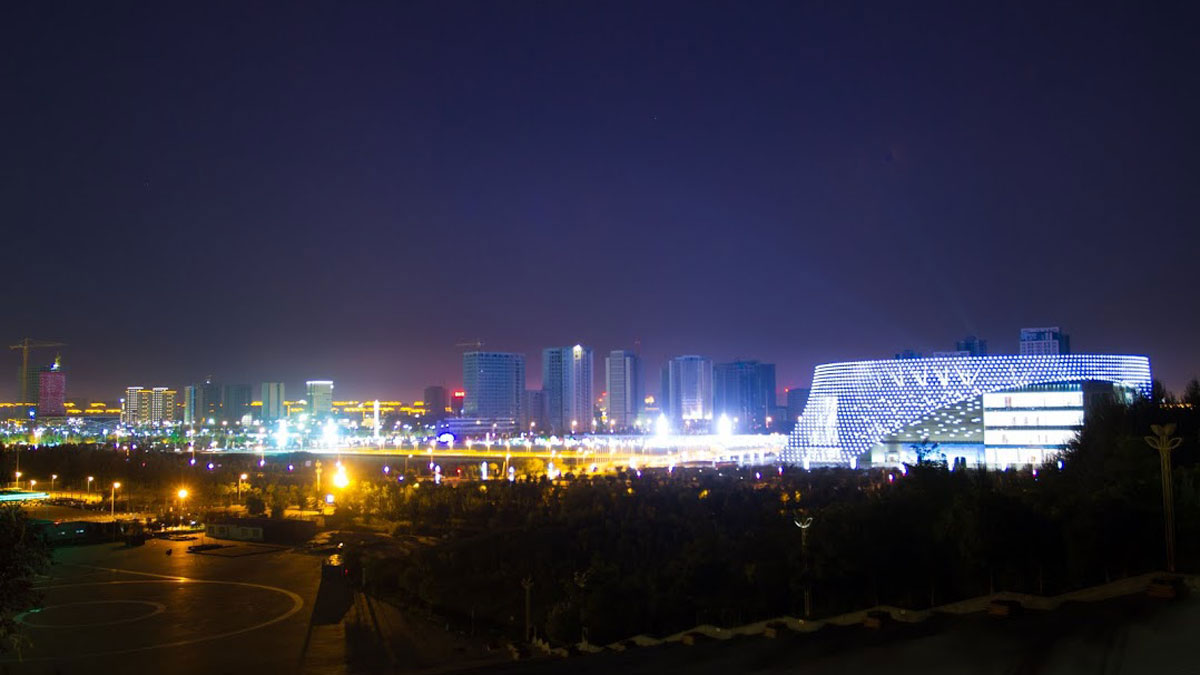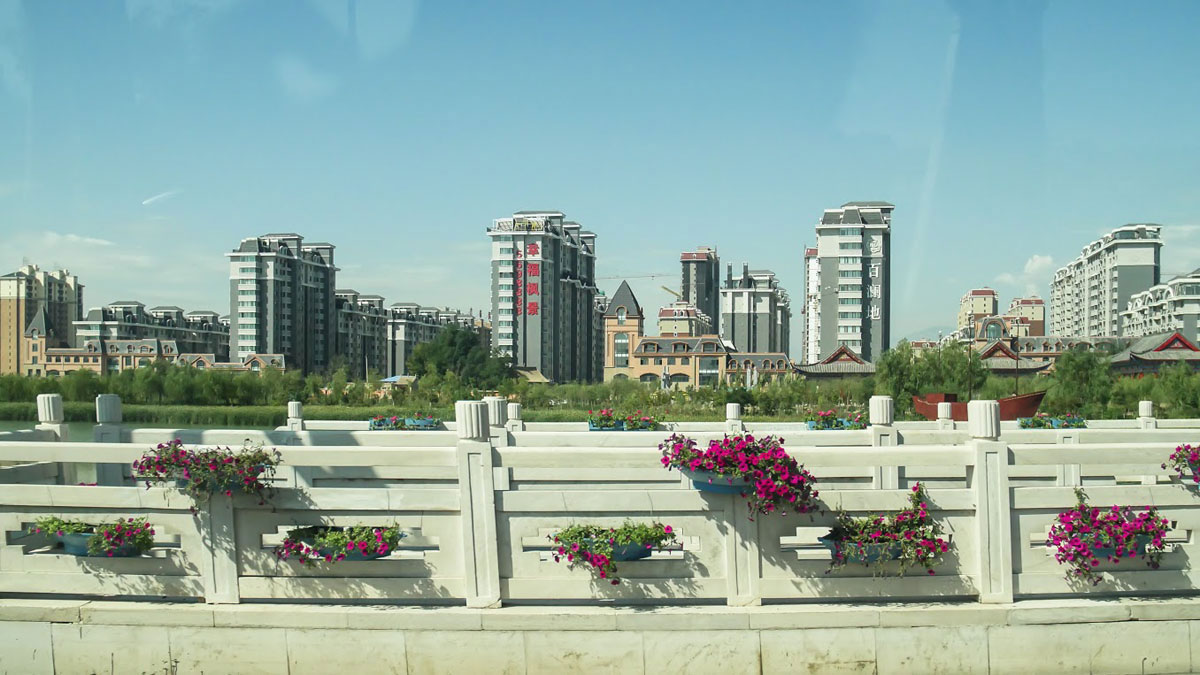The rise of China’s high-tech 'megacities'
Technology is helping China move 250 million people from the countryside to its new 'smart cities' by 2025

A free daily email with the biggest news stories of the day – and the best features from TheWeek.com
You are now subscribed
Your newsletter sign-up was successful
Standing in the middle of Yinchuan's cavernous City Hall, it's difficult not to be awed by the scale of ambition of the city's young mayor, Bai Shangcheng.
The building's vast marble foyer bristles with technology: sliding glass doors that greet you as you enter, self-service touchscreens on huge monitors, a cinema waiting room where you can watch films while you kill time, and QR codes scattered liberally around the building to quickly answer common questions, so you don't have to queue for a service desk if you have your smartphone with you.
The Week
Escape your echo chamber. Get the facts behind the news, plus analysis from multiple perspectives.

Sign up for The Week's Free Newsletters
From our morning news briefing to a weekly Good News Newsletter, get the best of The Week delivered directly to your inbox.
From our morning news briefing to a weekly Good News Newsletter, get the best of The Week delivered directly to your inbox.
The foyer's main feature is a glass cabinet housing a collection of 39 official stamps that the city used to use to manually grant building permissions and business licences, as well as issue passports, driving licences and more.
The age-worn stamps have now been replaced with streamlined digital systems that promise greater efficiency as the city in China's northwestern Ningxia Hui region steps up its bid to become not only one of the country's rising rural metropolises, but also a hub for business with the Middle East.

Yinchuan is a centre for Chinese Muslims, who constitute a third of the city's two-million strong population. The city is also now home to an annual exhibition, the China-Arab States Expo, which seeks to create business links between China and the Arab world.
Why smart cities?
A free daily email with the biggest news stories of the day – and the best features from TheWeek.com
At a major conference earlier this month convened by TM Forum, a non-profit organisation dedicated to connecting leading technologists from around the world, Yinchuan announced that in conjunction with the telecommunications company ZTE it is aiming to become China's premier 'smart city', a term used by town planners to describe the incorporation of high-tech solutions into urban spaces.
So what this mean and why is China so intent on creating so-called 'smart' cities?
A short trip around Yinchuan shows how quickly things are changing. Gigantic apartment blocks are under construction across the city, set around huge man-made lakes. Eight-lane highways weave through the centre of the construction.
Several new stadiums and convention centres litter the rapidly rising skyline. Most of the new buildings are still little more than empty husks, but they are being readied to receive a huge influx of new residents.
From country to city
This is the way of China, a country that is able to undertake social engineering involving a population four times larger than that of the US at the stroke of a pen. Two years ago, the Chinese government announced plans to move 250 million rural residents into newly-constructed towns and cities by 2025.
According to the New York Times, the move will "decisively change the character of China where the Communist Party insisted for decades that most peasants, even those working in cities, remain tied to their tiny plots of land to ensure political and economic stability."
The mass relocation of people from villages to cities is an attempt by the Chinese government to restore growth to its slowing economy and create a new city-bound consumer class. But moving vast numbers of people does not come without problems.
"Top-down efforts to quickly transform entire societies have often come to grief, and urbanisation has already proven one of the most wrenching changes in China's 35 years of economic transition," the New York Times says. "Land disputes account for thousands of protests each year, including dozens of cases in recent years in which people have set themselves aflame rather than relocate."

Can technology help smooth the way?
Yinchuan is hoping its swift development will prove more successful than elsewhere in the country. According to Peter Sany, the CEO of TM Forum, the city's implementation of new technology may help given its "all-encompassing approach". This includes "everything from digital health, to policing, e-government and administration, smart energy and much more".
So can technology help to prevent the difficulties that have been brought on by breakneck urban growth elsewhere in China?
Peter Marx, chief technology officer for the City of Los Angeles, told The Week that in his view all "cities are like families: messed up in their own special way". However, he added that urban planners were now beginning to "recognise that technology can help make life better," which explains the push towards smart cities both in China and around the world.
The age of the city
According to Paul Wilson, the managing director of Bristol is Open, a council-funded venture to turn Bristol in southwest England into a 'smart' city, the only place significant innovation can occur these days is at a city level.
"The nineteenth century was the age of the empire, the twentieth century was the age of the nation, but the twenty-first century is the age of the city," Wilson says. "Historically, local politics have been sneered at, but now cities can do more about global problems than nations can."
Nowhere does this seem more true than in China, which already has more than 100 cities with populations greater than a million people, and six of the world's 30 "megacities" whose populations, including satellite towns, exceed 10 million.
Changing China
Historically, Chinese cities were “built as producer centres rather than consumer ones”, says Tom Miller, author of China’s Urban Billion. They were planned with a focus on industry rather than on commerce. But all that is about to change, The Economist says, as "China has swapped its socialist dream for an American-style one of cars and sprawling suburbs."
The Chinese government appears to be recognising more and more that raising living standards is essential to the country's continuing success and making cities more liveable is one of the key ways to achieve that ambition. This year, the government has begun to downplay the importance of GDP growth as the sole criterion for success, according to The Economist. This should "free [local officials] to spend more money on making cities better places to live, rather than on laying concrete."
By 2050, the World Bank estimates that Chinese cities will contain more than a billion people. As that date creeps ever closer, many believe that so-called "smart" technology like that being installed in Yinchuan will be the primary factor that determines whether those cities are liveable conurbations that address citizens' everyday concerns about health care, security, pollution and transportation, or smoggy megacities that put progress ahead of people.
-
 Local elections 2026: where are they and who is expected to win?
Local elections 2026: where are they and who is expected to win?The Explainer Labour is braced for heavy losses and U-turn on postponing some council elections hasn’t helped the party’s prospects
-
 6 of the world’s most accessible destinations
6 of the world’s most accessible destinationsThe Week Recommends Experience all of Berlin, Singapore and Sydney
-
 How the FCC’s ‘equal time’ rule works
How the FCC’s ‘equal time’ rule worksIn the Spotlight The law is at the heart of the Colbert-CBS conflict
-
 Epstein files topple law CEO, roil UK government
Epstein files topple law CEO, roil UK governmentSpeed Read Peter Mandelson, Britain’s former ambassador to the US, is caught up in the scandal
-
 Iran and US prepare to meet after skirmishes
Iran and US prepare to meet after skirmishesSpeed Read The incident comes amid heightened tensions in the Middle East
-
 Israel retrieves final hostage’s body from Gaza
Israel retrieves final hostage’s body from GazaSpeed Read The 24-year-old police officer was killed during the initial Hamas attack
-
 China’s Xi targets top general in growing purge
China’s Xi targets top general in growing purgeSpeed Read Zhang Youxia is being investigated over ‘grave violations’ of the law
-
 Panama and Canada are negotiating over a crucial copper mine
Panama and Canada are negotiating over a crucial copper mineIn the Spotlight Panama is set to make a final decision on the mine this summer
-
 Why Greenland’s natural resources are nearly impossible to mine
Why Greenland’s natural resources are nearly impossible to mineThe Explainer The country’s natural landscape makes the task extremely difficult
-
 Iran cuts internet as protests escalate
Iran cuts internet as protests escalateSpeed Reada Government buildings across the country have been set on fire
-
 US nabs ‘shadow’ tanker claimed by Russia
US nabs ‘shadow’ tanker claimed by RussiaSpeed Read The ship was one of two vessels seized by the US military